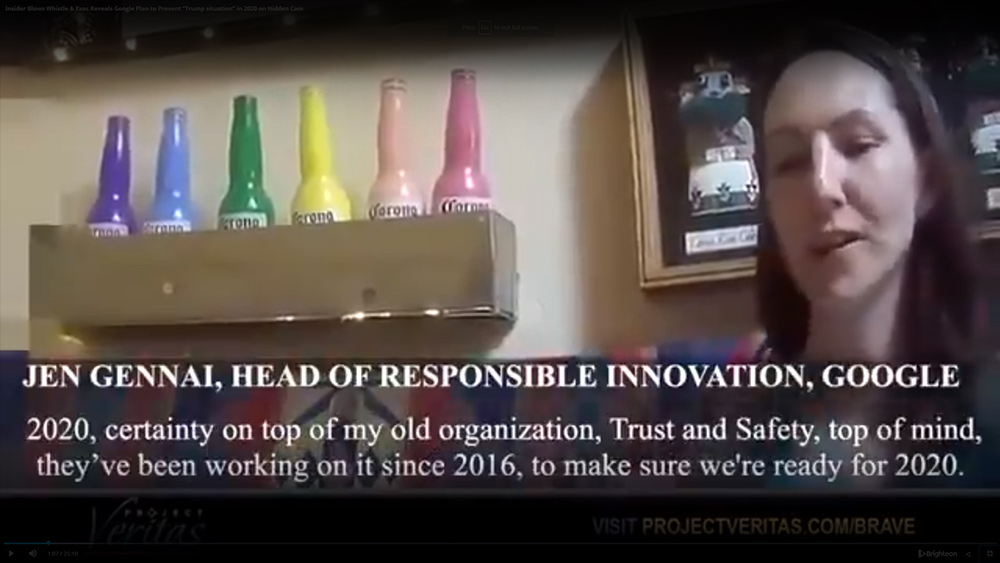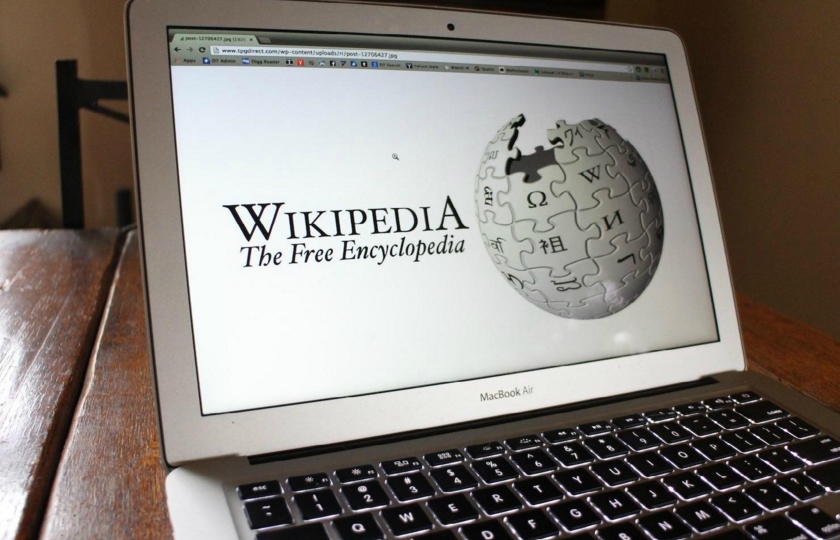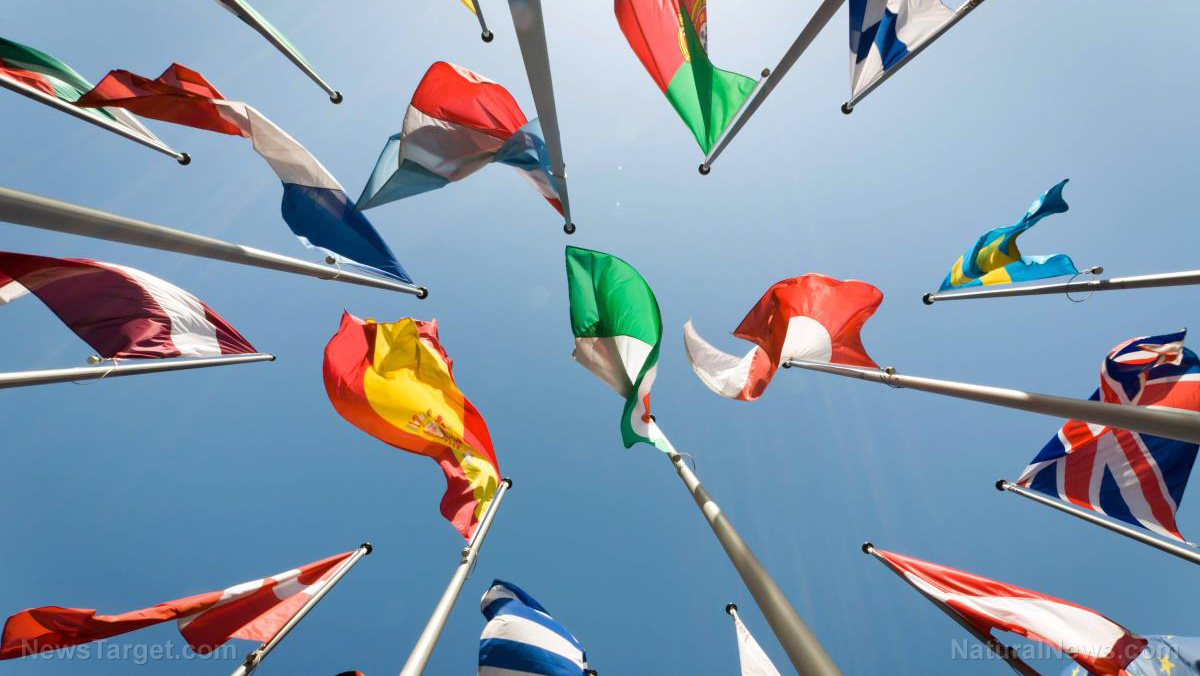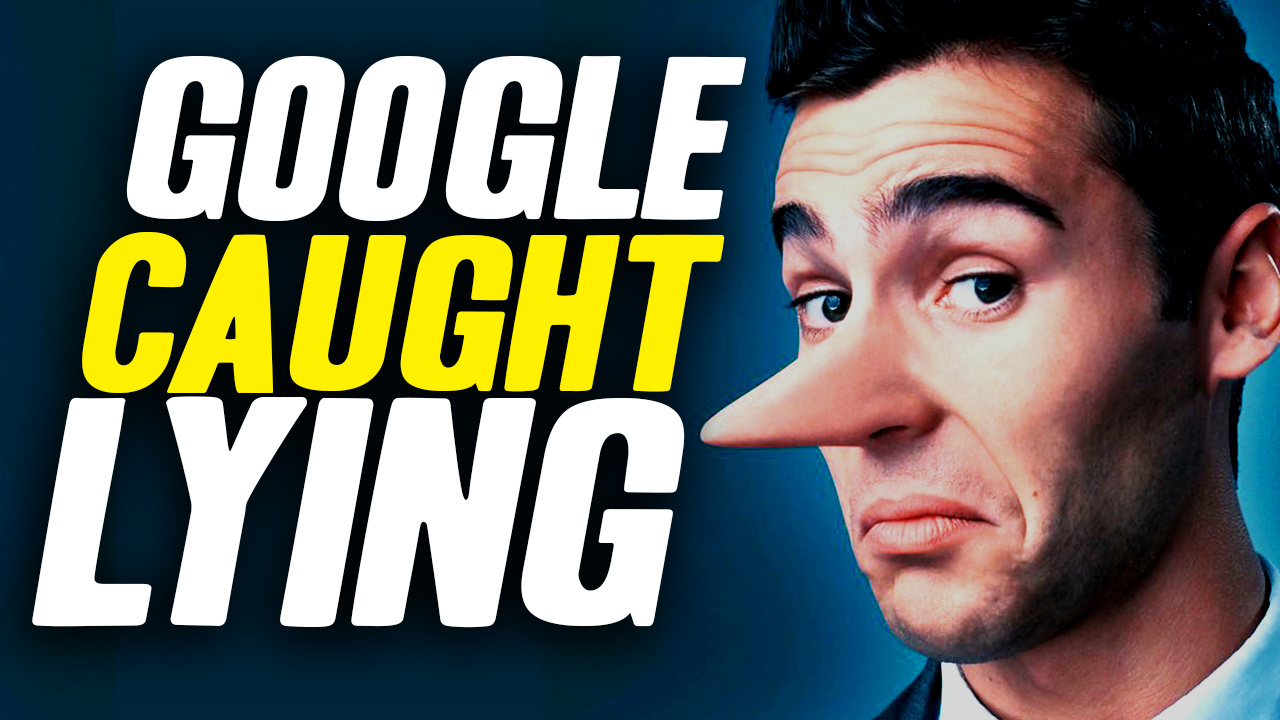Wikipedia: The new inquisition
04/09/2019 / By News Editors

Consider: you are given a serious diagnosis – cancer, dementia, multiple sclerosis – and your doctor runs you through the standard treatment protocol. It fails to reverse or cure the condition, leaving you hundreds of thousands of dollars poorer and sicker. It’s time to explore your options, you decide, and seek out others who’ve recovered or improved from your condition. Your doctor tells you you’re already receiving the gold standard of medical treatment – there’s nothing more to do now but try the protocol again, shell out for another round of chemotherapy or do crossword puzzles to “exercise” your brain as you gradually forget the names of your loved ones – but then you read about some natural therapy, administered by board-certified physicians, that seems to show promising results. Surely all doctors read the same literature, so you ask yours. Humoring you – and probably unfamiliar with the therapy, but unwilling to admit anything less than omniscience – your doctor tells you to do some research, certain there’s nothing out there that could possibly be superior to what he learned in medical school. You type the name of the therapy into Wikipedia, which everyone knows contains the sum total of medical knowledge and science, distilled by the experts and perfected through millions of edits. Surely, if there’s something to this therapy, Wikipedia will know.
(Article by Helen Buyniski republished from PRN.fm)
But Wikipedia claims this therapy doesn’t work. Worse, it condemns it as quackery, calling its practitioners charlatans and frauds preying on sick people. Not just this therapy, but other holistic modalities are methodically trashed, one by one. Wikipedia says your doctor was right. There’s his way, or the highway. Bewildered, you realize that all the people who think they’ve been healed or helped by these therapies must be delusional – it’s no more than a mass placebo effect. These quacks should all have their licenses revoked! And what a hoax, to perpetrate for so long – the entirety of naturopathy, chiropractic, Ayurveda, even Traditional Chinese Medicine – a fraud that has somehow persisted for hundreds, even thousands of years, on what amounts to billions of people! Even lifestyle adjustments and a plant-based diet have no therapeutic value, Wikipedia says, and you believe – after all, if it was wrong, someone would have changed it by now.
Wikipedia’s bias extends far beyond the realms of health and medicine, through the hard sciences, into politics, disparaging political views to the right and left of the neoliberal establishment. Every day, people visit Wikipedia to be informed and inspired, trusting in the validity and objectivity of the information they’re receiving, yet our two-year in-depth investigation has shown that pretty much everything about Wikipedia is wrong. Editors presenting themselves as experts are not experts at all, lacking any background in the fields they edit; some are anonymous “Skeptics” who reveal nothing of themselves but take pleasure in slandering and destroying the reputations of others, knowing they will not be punished; others take money to alter the perception of reality on behalf of moneyed interests, sanitizing political reputations, whitewashing corporate misdeeds, and altering the outcome of elections. Wikipedia’s impenetrable forest of regulations, embraced by the entrenched editorial elite who use them to discount the contributions of newcomers, are unevenly applied, always in favor of establishment interests. Whistleblowers, nutritionists, biologists, philosophers – anyone advocating a radical departure from the status quo is lined up for the reputational firing squad. There are no exceptions. Wikipedia has only one fate in store for heretics.
We have confirmed all our information with sources inside Wikipedia – editors, employees, whistleblowers, and people close to co-founder Jimmy Wales spoke to us about the problems that are destroying the site from the inside. It is appalling to think that Wikipedia has been able to set the parameters of truth and reality for so long, but only by acknowledging and grasping the extent of the fraud can we begin to remedy the situation. As a few examples, our research has shown that:
- Wikipedia (and its parent company the Wikimedia Foundation) has repeatedly violated IRS regulations governing nonprofit corporations, supporting certain politicians while denigrating others
- Wikipedia has lent its institutional support to repressive regimes all over the world, and has allowed itself to be used as a propaganda tool by such governments
- Wikipedia has selectively permitted pay-to-play editing and institutional conflicts of interest, particularly where generous donors are concerned
- Wikipedia has applied its rules unevenly to favor political and corporate establishment entities while libeling those it dislikes, in violation of its own policies
- Wikipedia has censored user-generated content, violating section 230 of the Communications Decency Act
…and much, much more.
We are asking the Justice Department, Congress, the IRS, and other authorities to investigate the Wikimedia Foundation and Jimmy Wales for these violations. There is enough here to begin major legal action against this company.
It is frightening to consider that one of history’s worst atrocities committed against innocent people – the Inquisition, which lasted from 1231 to 1826 – has been reimagined for the internet era by Jimmy Wales and his band of Skeptics and anonymous shills. The Inquisition revolutionized enforcement of the Church’s rigid orthodoxy by applying a bureaucratic method to what had previously been a haphazard and piecemeal process – it was marked by an unprecedented degree of organization in its gathering of information on heretics, and as a result was brutally effective. We see a similar outcome today in Wikipedia’s stamping out of dissent.
Day of Reckoning
Big Tech has gotten away with acting as the official censor and scribe of the ruling power structure for many years – quashing inconvenient speech where the government’s hands were tied by the First Amendment, deplatforming users who threatened the status quo, and pushing the establishment narrative even while presenting itself as the digital version of the public square – a free and open marketplace of ideas. At last, Facebook and Google are being unmasked as the tools of oppression they are – data-mining operations for the surveillance state and Pavlovian behavioral laboratories, shortcuts to the levers of power that have rendered much of the mainstream media’s expensive propaganda apparatus obsolete.
Responsible individuals in government – there are a few – are finally awakening to the need to rein in these powerful corporations. First Mark Zuckerberg, then Sundar Pichai have been hauled before Congress to answer questions about the nature and extent of their control over the flow of online information. There is talk of antitrust action and of reevaluating these sites’ Section 230 protections. Section 230 of the Communications Decency Act immunizes neutral content platforms against libel prosecutions based on users’ speech, so long as the platforms merely host that speech and exercise no editorial control over its content. Users can sue, but they must sue the user who posted the defamatory content – not the site that hosted it. Section 230 allowed the internet to flourish as a free expression zone, with sites unafraid of legal repercussions from permitting visitors to speak freely.
When sites like Google and Facebook begin exercising control over what speech is and is not allowed, however, section 230 no longer applies. As the boundaries for what is considered acceptable discourse narrow further, it’s impossible not to see the work of Facebook’s tens of thousands of content moderators as they (somewhat arbitrarily, a recent investigation has revealed1) pick and choose what posts are banned political speech and what are harmless memes. Disillusioned Facebook users are jumping ship by the millions, with as many as 42 percent of Facebook’s US users taking a lengthy hiatus from the site over the past year and a full 44 percent of US users ages 18 to 29 actually deleting the Facebook app from their phones.2 Wikipedia, too, has been losing editors for many years – its core of “active” editors decreased 40% from 2007 to 20153 – but many casual users still treat the site’s pronouncements as gospel truth, their critical capabilities muted by the reassuring “encyclopedia” format.
But even as Facebook and Google face their long-awaited reckoning, Wikipedia has largely escaped regulatory scrutiny. Because it measures its profits in the millions, rather than billions, it flies under the radar of any economic analysis of the Big Tech playing field, even though it is the fifth-most popular website on the internet. A British poll revealed users actually trust Wikipedia more than the BBC4 – perhaps unsurprising given the record-low level of trust most people have in the mainstream media these days, but still shocking considering that no qualifications are necessary to edit the “free” encyclopedia. While it has a reputation as an open-source utopia of knowledge, a one-stop shop for answers on all topics, Wikipedia is as much an oligarchy as the society that has embraced it. To paraphrase George Orwell, all Wikipedia editors are equal, but some are more equal than others.
Wales himself has effectively admitted Wikipedia is not merely a neutral platform of the sort protected by section 230. “People get frustrated when they thought it was all about voting. But we’re writing an encyclopedia here; it’s not an open democratic experiment.”5 Like the US government, Wikipedia offers its users the illusion of participation in a democratic system, but when they stray beyond the accepted behavioral parameters, enforcers are waiting to restore order. Touting this system as the best of all possible worlds, he explains that formerly neutral platforms actually have a duty to “build better software to give communities better control, so that your best voices come to the front, and the people who aren’t there for constructive reasons are marginalized and asked to leave.”
Pervasive bias maintained by editorial fiat
All of which sounds fine until we remember what Wales and his coterie of fawning admins consider “constructive.” Wikipedia’s political slant toward neoliberal centrism has so alienated conservatives that conservapedia.com, launched in 2006 to counter a perceived bias against Christianity on Wikipedia, experienced massive growth in its userbase in 2016 as voters, confused and put off by the biased election coverage available on supposedly-neutral Wikipedia, sought balance elsewhere. It’s easy to see why on perusing some of the personal essays of Wikipedia’s top editors. User BullRangifer writes that anyone who does not believe that the Trump campaign colluded with Russia to win the 2016 election “lack[s] the competence needed to edit American political subjects” because they are victims of “fake news.” The “fake news” link, of course, points to a Wikipedia page authored in part by the user who wrote the essay,6 but circular logic does not seem to bother him. BullRangifer’s views are squarely in the mainstream of Wikipedia’s political editors, and he frequently speaks in the voice of Wikipedia, offering lists of “reliable sources” to users he feels are confused.
Wikipedia editors claim to have democratically chosen to blackball the Daily Mail and now Breitbart as sources based on their alleged proclivity for publishing “fake news,” but no sitewide vote was taken. Indeed, only a few dozen editors weighed in at all, and the Daily Mail measure was passed without the knowledge of much of Wikipedia’s userbase.7 There have been multiple attempts to reverse it since, all unsuccessful.8 Wales’ presence on the board of Mail competitor The Guardian, a British paper with a known center-left slant, is no coincidence – nor is that paper’s continued inclusion on Wikipedia’s list of reliable sources, despite revelations it published a fake story about a meeting between former Trump campaign director Paul Manafort and imprisoned WikiLeaks founder Julian Assange – a scandal WikiLeaks called “one of the most infamous news disasters since Stern published the ‘Hitler Diaries’.”9
Wales was forced to step down from the Guardian’s board when he launched WikiTribune, a hybrid of Wikipedia and “normal” journalism that has since fired all its employees and switched to a more “community-based” model essentially indistinguishable from Wikimedia subsidiary Wikinews, promising to reinvent itself as a more traditional media platform at some nebulous future date.10 It is also worth asking what will happen to subscribers’ donations now that WikiTribune is switching to a volunteer-based model. Now that readers are not paying writers’ salaries, they cannot expect to have any say in what topics are covered, even though this was an initial selling point in attracting investors to WikiTribune’s subscription-based business model11 – though Wales never planned to offer subscribers real input into the site’s editorial process anyway, according to a Reddit Ask Me Anything he held in 2017: “if 10,000 advocates of Pizzagate sign up to have us investigate Pizzagate, they might be disappointed with the results.”12
WikiTribune’s founding was essentially choreographed by the Minassian Group, which set out a media strategy for the Wikimedia Foundation to follow that Wales promptly cannibalized for his personal pet project. Run by Clinton Foundation chief communications officer Craig Minassian, the Minassian Group was paid over $1 million over the course of two years13 14 to train Wikimedia’s C-level staff in media strategy and conduct a “communications audit” that recommended the Foundation position itself as an island of neutrality in a roiling sea of bias. Wikimedia was told to discuss “getting back to facts again” after the 2016 election and to solidify alliances with “friendly” journalists at reputable sources.15 A Wikimedia employee who had worked closely with Minassian was immediately placed on the task, giving a chummy interview to Vice about how Wikipedia deals with “fake news” to assuage users’ uncertainties over the site’s vulnerability to political manipulation,16 while the foundation itself published a sanctimonious defense of “facts” in its year-end newsletter and accompanying report (titled, in a cosmic irony, “Facts Matter”).17
The sheer volume of Wikipedia editing surrounding the term “fake news” that took place around the time of the 2016 election should give any politically-astute observer pause – a single editor “Sagecandor” clocked 904 edits to an article on “fake news websites,” 631 edits on “Russian interference in the 2016 election,” and 275 edits to “murder of Seth Rich” in the months immediately following Trump’s victory, logging hundreds more edits to other terms related to the “Russiagate” narrative – “Comey memos,” “kompromat,” and “efforts to impeach Donald Trump” – and creating several articles for anti-Trump books during that period.18 The user essentially laid the groundwork for the Russiagate conspiracy theory through their nonstop editing, ensuring the curious browser would come away from Wikipedia with a more fully-(mis)informed idea of precisely which propaganda techniques the Russian bogeymen were using to influence our malleable American minds. They even misrepresented a common rhetorical device (the “tu quoque” argument, which they referred to as “whataboutism”) as a Soviet propaganda technique despite a lack of contemporary sources supporting their conclusions19 in an effort to buttress the Russiagate scenario, a form of “original research” not allowed on Wikipedia. When other users objected, they merely outlasted them in hostile, stubborn arguments that stretched on for hundreds of responses – arguments often cross-posted to the talk pages of similar articles where they were pushing the same agenda. Another user became suspicious of Sagecandor’s writing style and “POV-pushing,” as well as their habit of dragging other users before Wikipedia’s disciplinary proceedings over minor infractions and flattering users with admin powers in order to curry favor, behaviors they recognized from a user who had lost his administrative privileges for his inability to check his political bias at the door when editing. This user voiced their suspicions, methodically laying out proof that Sagecandor was the defrocked admin Cirt, but instead of heeding the warning, admins promoted Sagecandor, giving them auto-patrolling and page moving powers that allowed them to edit protected entries without another user signing off on the edits. Sagecandor accused their accuser of being a Kremlin operative and reported them for “wikihounding” – essentially, stalking and badgering20 – and the user was banned while Sagecandor continued to antagonize editors who didn’t toe the party line. Last year, it was finally proven that Sagecandor was, in fact, Cirt, but the person who had come forward with the original evidence had to wait several more months before their ban was lifted. None of the admins who supported the ban ever apologized, and several have threatened to ban the user for his posts since then, posts which frequently question the Russiagate conspiracy theory and other neoliberal orthodoxy.21
In his previous incarnation, Cirt was integral to expanding and linking to the article for the neologism “santorum” – columnist Dan Savage’s retaliation against then-Senator Rick Santorum’s comments comparing gay marriage to bestiality which repurposed his last name as a nauseating bodily fluid concoction. Other editors suspected his activities were designed to force the Wikipedia entry to appear higher in Google’s search rankings for his name than the Senator’s own website.22 Santorum himself attempted to have the most egregious results for term delisted from Google in 2011 only to be told Google doesn’t do that23 (but try searching for “Hillary Clinton health”). Cirt was eventually topic-banned from editing politically-sensitive biographies of living people due to his inability to maintain Wikipedia’s requisite neutrality. Editors involved in the action agreed that he was incapable of restraining his distaste for conservative politicians.24 But this was in 2011, before Wikipedia was paying the Clinton Foundation’s official consulting firm to train its employees – at some point, being an incorrigible ideologue changed from a bug into a feature.
We know that individuals from the government edit Wikipedia on a regular basis – there’s an entire Twitter account devoted to publicizing the edits of congresspeople and their staffers, and one of the earliest conflict-of-interest scandals to hit the site involved revelations that the CIA and FBI were attempting to rewrite history on the Iraq war and other politicized events. When the news first broke that congressional staffers were editing their politicians’ bios in February 2006, Wikipedia actually banned all congressional IP addresses before coming up with the Twitter feed, which served as an official disclaimer that it did not condone such behavior.25 A blanket ban may seem like an overreaction, but as a non-profit organization, Wikipedia parent company Wikimedia Foundation is expressly forbidden under the IRS code from “voter education activities with evidence of bias that (a) would favor one candidate over another; (b) oppose a candidate in some manner; or (c) have the effect of favoring a candidate or group of candidates.”26 The congressional edits were flagrant electioneering on the part of staffers, and Wikipedia would have been guilty by proxy. It isn’t bias that they fear, but the appearance of bias, which in this case would jeopardize their non-profit status.
Such awareness of the danger of crossing the line into political campaigning seems to have dissipated with time, however. In 2011, the Stanton Foundation donated $3.6 million to Wikimedia, then the largest one-time gift in the foundation’s history. Wikimedia then used $53,000 of that donation to hire Tim Sandole as a Wikipedian-in-Residence at Harvard University’s Belfer Center. Not only did Sandole punch a hole in the firewall that is supposed to separate the two by taking money from Wikimedia to edit Wikipedia, but he appeared in his official Wikimedia-funded Belfer Center capacity at a campus event promoting Barack Obama over Mitt Romney in the 2012 election.27 Nonprofits are forbidden from campaigning for political candidates. But political bias is woven so far into the fabric of Wikipedia at this point that to eliminate it would be nigh on impossible.
Anti-Trump sentiment has remained at a fever pitch on Wikipedia since the 2016 election. Even now, the article on Trump gives ample space to discussions of the “Russiagate” investigation and even “Impeachment efforts,” though no impeachment proceedings have passed the introduction stage; the Hillary Clinton article glosses over most of the scandals that have dogged her political career, offering a sanitized account of the “email controversy” while entirely omitting the revelations from the WikiLeaks DNC and Podesta email document dumps (perhaps because the Podesta emails include a reference to Minassian inserting favorable references to the Clinton Foundation in an episode of the Colbert Report,28 and certain editors were worried users might put two and two together). “Some commentators” are given space to air their speculation on how Trump might be impeached without a vote, yet no voices are quoted taking Clinton to task for her role in rigging the Democratic primary. Nor do we find references to her role in plunging the once-progressive nation of Libya into violent chaos, or in appropriating billions of dollars’ worth of donations meant for Haitian hurricane victims. Trump is taken to task for “comments and actions [that] have been perceived as racially charged” – an accusation with no citation – but Clinton’s racially-charged “super predators” comment is missing from her page. There is clearly a double standard at work.29 30
Nor is it only Trump that is the recipient of the Wikipedia cognoscenti’s venom. When Google search results returned “Nazism” as the ideology of the California Republican Party just a week before that state’s primaries in 2018, Google was quick to blame Wikipedia vandalism, explaining that the Google “knowledge box” that contained the offending term is often populated with Wikipedia text.31 The “vandalism” had remained on the party’s Wikipedia page for six days before it was corrected, hidden in a “piped link” where the link text and “alt text” read differently; meanwhile, other edits were reverted within a few minutes, suggesting this one was allowed to persist, deliberately hidden so it would only appear in Google search results.32 Rep. Louie Gohmert (R-TX) mentioned during the Google congressional hearings that his office’s efforts to remove smears from his biography were always reverted the same day,33 something that would be unthinkable on the biography of a Chuck Schumer or a Nancy Pelosi. Gohmert is accused on Wikipedia of being a liar and a defamer for voicing his opinions on financial speculator George Soros during a Fox Business appearance.34 Soros has been a major Wikimedia benefactor for years, and it is no surprise that Gohmert is forced to wear the scarlet letter for daring to speak out against him. Wikipedia’s hostility toward the political Right is well-known and long-established, hence the rise of Conservapedia, and while most biased edits aren’t quite as obvious, they are notable for their ubiquity.
Conservative commentators like Sean Hannity and Alex Jones get notations in their lead biography sections claiming they spread falsehoods and conspiracy theories, while popular liberal hosts like Rachel Maddow and Amy Goodman who have also spread false stories do not carry such disclaimers in their bios. Even DrudgeReport.com, the most-trafficked news site on the internet, is targeted for a smear for spreading “conspiracy theories” Wikipedia claims site operator Matt Drudge knows to be untrue. For years, editors added and re-added unsourced quotes to the Wikipedia and Wikiquote pages of Rush Limbaugh despite no record of his ever having said the inflammatory words.35 Conservative politicians get swollen “controversy” sections that dwarf their liberal counterparts’, which may be relegated to a separate page entirely (as editors have done with Hillary Clinton’s myriad “controversies” – though even on the dedicated page, they’re sanitized and whitewashed almost beyond recognition).
While official Wikipedia policy mandates editors declare their conflicts of interest if they are being paid for their work, this is rarely done in practice, and it is impossible to tell how much of this political manipulation comes from volunteer ideologues with too much time on their hands and how much comes from paid political operatives. There is evidence that Wikipedia is heavily infiltrated with Democratic insiders, including an editor who somehow knew Clinton’s vice presidential pick would be Tim Kaine before anyone else did.36 We know that David Brock’s superPAC Correct the Record paid a veritable army of trolls to infiltrate various social media platforms during the 2016 election to “push back” at anti-Clinton comments. The Barrier Breakers program, according to a whistleblower who claims to have worked for Brock, spent millions of dollars to arm its footsoldiers with established accounts that blended seamlessly into the conversation at Twitter, Reddit, and other social media platforms and sicced them on anyone discussing the Clintons or their Foundation unfavorably.37 Yet these problems have never been addressed at Wikipedia, as the ideological drift mirrors Wales’ own neoliberal political tendencies – he’s friends with the Clintons, whom he calls “Bill and Hillary,” and once personally involved himself in massaging Hillary’s Wikipedia entry during an argument over whether her official name should be “Hillary Clinton” or “Hillary Rodham Clinton.”38 Meanwhile, those opposed to centrist-authoritarian politics are increasingly made to feel unwelcome. Such uneven enforcement of policy is not just unfair – it’s illegal.
This isn’t to say Wales is an ideologue. He’s more dangerous than any ideologue. Ideologues are biased and we can recognize their bias in everything they publish, discounting their views accordingly as being mere opinion. Even Jill Abramson, former editor of the New York Times, recognizes how her old paper has become an ideological mouthpiece for anti-Trump sentiment – a political view she agrees with, but which she sees as detrimental to the outlet’s status as the Paper of Record. But when Wikipedia, an ostensibly neutral resource used by millions of students, researchers, and casual browsers, is weaponized in service of an ideology, many users are none the wiser.
Adventures in foreign policy
Wales actively takes advantage of this “halo effect” and even sells it to repressive governments around the world while claiming to stand for transparency and a free press. His “Wikipedian of the Year” awards regularly go to editors who collaborate with their repressive home governments to turn Wikipedia into another arm of the state, as in the example of the first recipient of the award in 2011, Rauan Kenzhekanuly of Kazakhstan. While Wales insisted Kenzhekanuly was an independent editor who just wanted to improve Kazakh Wikipedia, he was in reality a former government official (who has since taken up a new government post, perhaps a reward for forging the alliance with Wikipedia) whose organization, WikiBilim, was funded by the Kazakh sovereign wealth fund. WikiBilim arranged with Wikipedia admins to have the entire government-backed Kazakh encyclopedia uploaded to Wikipedia’s servers. By the end of 2011, WikiBilim was described in Creative Commons documents as “a non-profit organization which also operates as the local representative of Wikimedia. Wikibilim in turn is supported by the Government of Kazakhstan and personally by the Prime-Minister Mr. Karim Masimov.”39 Yet Wales was still claiming WikiBilim was apolitical in December 2012, when he closed a discussion on his talk page after he was confronted with incontrovertible evidence of WikiBilim’s links to the regime.40 In 2014, Kenzhekanuly was named deputy governor of the Kyzylorda region of Kazakhstan, and in an April 2015 Reddit “Ask Me Anything,” Wales lamented his lack of foresight in naming him Wikipedian of the Year, saying he wouldn’t do it again. He even seemed to turn on his former mentor Blair: “Tony Blair absolutely should be slammed for taking money from Kazakhstan. I condemn it without reservation.”41
Wales and Blair have been something of a tag-team in crisscrossing Eastern Europe and the Middle East offering the blessing of western capitalism in exchange for cold hard cash. While Blair takes home the lion’s share of the money, Wales gets photo ops and PR nightmares, as when Wikipedia users rebelled after he was awarded the $500,000 Sheikh Mohammed bin Rashid Al Maktoum Knowledge Award by the ruler of Dubai in December 2014. While Wikipedians insisted he should refuse the award, given the UAE’s abysmal human rights record, Wales figured he could have his cake and eat it too, opting to start a ‘human rights foundation’ which, despite its stated mission of fighting for freedom of expression in repressive regimes, has done nothing since hiring Israeli human rights lawyer Orit Kopel to repost articles condemning a selection of repressive regimes.42 Not a single article denounces the appalling state of press freedom in the UAE. Nor does the Foundation call out Israel, whose snipers deliberately shot journalists covering the Palestinian March of Return this summer. Palestinian journalists, activists, and ordinary social media users are increasingly prosecuted for “incitement” for merely “liking” Facebook posts that may be entirely devoid of political content. Since October 2015, over 280 social media users have been arrested for “online incitement to violence,” and many influential Palestinian journalists’ accounts have been unilaterally shut down.43 Such repression would seem like a situation tailor-made for Wales’ Foundation – yet he and Kopel are silent. Wales received the $1 million Dan David prize from Israel in 2015, but his loyalty was purchased long before that, as evidence of his turning a blind eye to Wikipedia manipulation by Israeli state interests dates back to at least 2008. Perhaps he sees the closeness of the relationship between Wikipedia and the Israeli government as something to emulate – the chairman and spokesman of Wikimedia Israel, Itzik Edri, who for two years also sat on the global WMF’s funds dissemination committee, also manages PR for former Israeli president Shimon Peres (who was interviewed by WikiNews in 2004). Lest his propaganda efforts be in any doubt, Edri received the 2014 Roaring Lion Award from the Israeli Public Relations Association for his work on Wikipedia’s tenth anniversary campaign while working directly with the current Knesset opposition leader in a role that involved “crisis management.”44
Israel was on the cutting edge of Wikipolitics, having burrowed into the editorial ranks of the site long before tin-pot dictators like Nazarbayev and his Azerbaijani counterpart Aliyev (who sponsored a “WikiDays” initiative in 2014 to “protect interests of Azerbaijan in Wikipedia and prevent distortion of information about Azerbaijan”45) thought of using it for state propaganda purposes. An April 2008 exposé revealed that the Committee for Accuracy in Middle East Reporting in America (CAMERA) had been teaching agents how to rewrite history on Wikipedia for years, instructing them to avoid alerting other editors to their mission by sticking to neutral content for a few months before getting to work on Israel-related articles. They were taught how to game Wikipedia’s ever-growing system of rules to get unfriendly edits reverted and unfriendly editors banned, told to form alliances with non-affiliated Wikipedians, and encouraged to work towards admin status in order to help their fellow agents. All collaboration occurred offline in a private Google group called “Isra-pedia.”46 When the scandal came to light, it was duly written up in CAMERA’s Wikipedia entry, only to be erased by a user working from the offices of the US Department of Justice. An admin blocked all DoJ IP addresses for several days while other users implicated in the CAMERA edits were topic-banned from editing articles relating to Arab-Israeli conflict, and one user was banned entirely,47 but such obstacles are easily overcome on a site where anonymity is paramount. Any users patient enough to make hundreds of neutral edits to gain the community’s trust before embarking on a Zionist crusade to rewrite history are patient enough to repeat the process. In 2010, after two more groups publicly offering classes in “Zionist editing” were brought to his attention, Wales merely slapped token protection on the “Israel” article, claiming the three groups’ work had amounted to essentially nothing,48 even as the character of Wikipedia’s coverage of Israel has irreversibly slanted in favor of the Jewish state and packs of roving admins vote en bloc to keep it that way. He regularly tweets in support of the Israeli Defense Forces as they lay waste to Palestinian villages. Other governments – and factions that would like to become governments, like the Iranian exile death-cult Mujahedin e-Khalq – have taken their cue from the Israelis, trying to edit their way into the people’s hearts by whitewashing a history of terrorism and murder one edit at a time.
One rule for me, another for thee
Wikipedia’s rules insist editors “assume good faith,” but this does not apply to heretics. Those who question both political orthodoxy and “accepted wisdom” in other areas – health and medicine, for example – are mercilessly targeted by Wikipedia’s shock troops, who as often as not seem to enjoy inflicting reputational damage because they derive satisfaction from their victims’ suffering. A prolific group of so-called Skeptics has made it their mission in life to stamp out what they call “woo” – anything not immediately explained by the laws of Newtonian physics, or deviating from the mainstream of pharmaceutical-based western medicine. They target not only alternative medical practitioners but entire disciplines with an Inquisitional zeal, while Wales sits above them, an internet Torquemada, cheering them on as they apply the thumbscrews and ensuring none of Wikipedia’s rules that theoretically protect living persons from libel get in the way of administering a proper character assassination. Skeptic editors collaborate to declare a person or a topic “Fringe,” after which the standards for verifiability and neutrality decrease substantially, allowing editors to add false and defamatory content without worry another editor will come along and revert their libel. “Fringe” articles are fair game for these internet inquisitors to test out their finest torments. It’s normal to see counsellors who have helped thousands of people denigrated as “quacks,” and the problem is so widespread that over 11,000 users actually submitted a presentation to Wales urging him to address the problem. He effectively laughed in their face, responding that Wikipedia would not consider the work of “lunatic charlatans” – classifying all holistic healers as such and inspiring the Skeptics on to greater heights of defamation.49 Meanwhile, any smears against the Skeptics’ heroes are immediately removed – former stage magician and Skeptic icon James Randi’s bio is an example of the shameless flattery these editors offer their idols. Were it merely a case of both sides flinging mud, Wikipedia would at least be fair. But permitting one side to break all rules in pursuit of ideological conquest while the other side is trapped in an impenetrable thicket of rules destroys the myth of Wikipedia as a neutral platform.
Wikipedia co-founder Larry Sanger himself dismissed the notion of neutrality on Wikipedia as laughable. “I’ve been reading Wikipedia articles for years, and from the evidence I would not have thought such a thing exists, or, if it does, the name is somewhat misleading, because the policy would read something like: ‘On all matters cultural and political, Wikipedia will endeavor to crush conservative viewpoints. Neutrality will not be tolerated.’ Just read the post on, for example, intelligent design theory. It is written by the theory’s antagonists, and all efforts to correct the post to reflect the real theory, as opposed to the straw man caricature presented by its opponents, are ruthlessly suppressed.”50 Wikipedia’s mandate to “assume good faith” is even flimsier in light of Wales’ Objectivist beliefs. A disciple of Ayn Rand, Wales eschews altruism and reveres selfishness; even putting his personal philosophy aside, five minutes on any internet discussion board would disabuse one of the notion that “good faith” is the operating principle of most posters, and for Wales to insist that others assume the essential goodness of humanity while reserving a healthy cynicism for himself and his henchmen is absurd.
Wales has personally involved himself in applying the rules unevenly – even making them up as he goes along, as in the case of Wikimedia’s open-source education subsidiary Wikiversity. When a group of users attempted to start a project called “The Ethics of Breaching Experiments” in early 2010 – essentially an experiment meant to test Wikipedia’s defenses against vandalism and other rule violations – Wales used his site-wide moderating powers to delete the project entirely and ban the associated users. Wales, who had never before shown any interest in Wikiversity, was thrown off guard by the backlash to his actions – unlike Wikipedia, where he is only semi-ironically revered as the “god-king,” Wikiversity harbored several users banned from the main encyclopedia for “ethical breaches” like those described in the project, none of whom appreciated his barging into their virtual classroom. When users protested his unilateral suppression of free inquiry – the ostensible mission of the Wikimedia Foundation itself – Wales threatened to shut down Wikiversity entirely. Hundreds of users in return voted to strip Wales of his founding privileges, condemning him for betraying the stated mission of the project. He finally backed down, unbanning the wrongthinkers and self-limiting his admin powers,51 but not before telling them that he had “the full support of the Wikimedia Foundation” and could shut them down whenever he liked. When the self-styled “benevolent dictator” of Wikipedia shuts down a semi-autonomous project for doing what it was supposed to do – Wikiversity was launched to encourage the kind of “original research” barred from Wikipedia pages – and then bullies the the site is broken beyond repair. Wales’ behavior on both Wikicommons and Wikiversity violates section 230 as well, since it represents deliberate curation of content on Wales’ part.
Moral relativism is no way to run an encyclopedia
Wales’ morals are not like most people’s. When the user Essjay, a member of Wikipedia’s mediation committee who claimed to be a tenured religion professor with a PhD, was exposed as a community college dropout in March 2007, Wales first said he “didn’t really have a problem with it,” only calling for Essjay to resign after users demanded action. Wales, who publicly “forgave” Essjay while grudgingly administering his public punishment, had already hired him at Wikipedia’s for-profit sister company Wikia and clearly didn’t mind the identity fraud. Indeed, it was that hire that tipped off an alert reader to Essjay’s real identity. The reader contacted the New Yorker, which had just run a glowing profile of Essjay and Wikipedia without fact-checking a single biographical detail, and the whole edifice of lies collapsed. Not a problem for Wales – Essjay was “an excellent editor with an exemplary track record,” never mind how his lying might damage Wikipedia’s credibility or the ability of other editors to “assume good faith.”52 Wales’ sympathy for Essjay’s autodidacticism (the 20,000 edits he logged on mostly religion-related entries were cribbed from books like “Catholicism for Dummies”) may stem from his own failure to finish his doctorate at the University of Indiana – while he claims academia merely “got boring” when the subject comes up in interviews, it is certainly puzzling that he would wait until he had put in all the work on a PhD dissertation to become bored, and there are rumors that some greater infraction was involved. Essjay was fired from Wikia as well, but only when ZDnet started making noises about contacting its investors, including Amazon and the Omidyar Network, to ask how they felt about Wales’ hire of a known fraud.53 Wales even briefly talked about requiring credentials for editors who presented themselves as credentialed experts – an idea which quickly fell by the wayside when the public had moved on to the next scandal.54
Qualifications clearly mean little to Wales and the Wikipedia community. Sanger has accused Wikipedia of overt hostility toward credentialed experts, and he is far from the only academic to be turned off by the mob mentality of the site’s editors, who tend disproportionately young and overwhelmingly male. Because Wikipedia editing can become a time-consuming hobby, the top editors tend to be un- or underemployed, though this is by no means the case for all. Surely, Wales would have no objection if a group of these unemployed editors opened a storefront medical clinic? After all, expertise is overrated, and it’s important to assume good faith. If these guys want to help people, who are we to stand in their way? Maybe the person clumsily wielding the scalpel to begin your appendectomy (where’s the appendix, again?) just couldn’t afford to finish medical school – they’ve certainly spent enough time editing medical articles on Wikipedia to know all about health. What’s the harm, Jimmy?
Clearly this is reductio ad absurdum, but it underlines the utter ludicrousness of allowing anonymous trolls to essentially rewrite medical reality. No matter how many facts an expert editor has on their side, there will always be dozens of trolls with more time on their hands – or more corporate or political funding to pay for their time – willing to revert the expert’s edits. On Wikipedia, might makes right. The ends justify the means. All the faux-altruism and assumptions of good faith are just window dressing, a velvet glove for the iron fist Wales wants to use to gain control over the world’s information channels. Wales only develops morals when community outrage – from users, from investors, from the media – demands he display them. It is public perception of the crime, not the crime itself, that mandates action in Wales’ world. This is a person with more respect for narrative than truth, and not the kind of person who should be running a crowd-sourced repository of knowledge.
But perhaps we shouldn’t hold Wales responsible. He has simply been born into the wrong era. He’d be far more at home in the Middle Ages, wearing the robes of Torquemada and stacking firewood around some hapless wretch who made the mistake of trying to heal a village child with an herbal preparation. Or perhaps he’d be better suited to the wintry climes of Stalingrad, presiding over a show trial where the defendant is convicted before he enters the room. An internet community – even one with hundreds of thousands of users – bears the indelible influence of its creator, and this is not a man with the qualities suited to running an open-source repository of knowledge.
Read more at: PRN.fm
Tagged Under: Alt-Left, bias, Big Tech, Collusion, corruption, deception, disinfo, fake news, Glitch, Jimmy Wales, left cult, lies, propaganda, tech giants, Wikipedia, Wikipedia scam
RECENT NEWS & ARTICLES
COPYRIGHT © 2017 BIASED NEWS



















